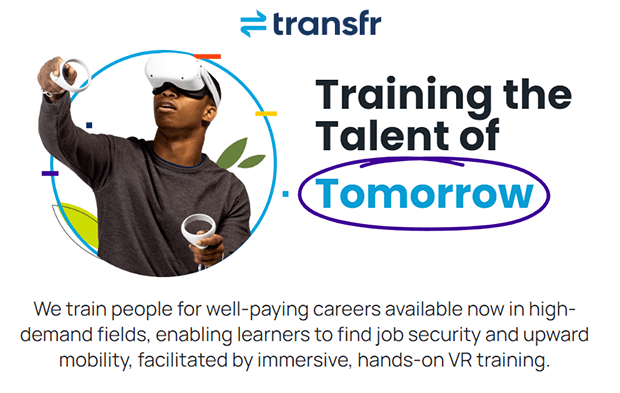
Transfr, an innovative startup specializing in VR tools for training and career development, has successfully secured $40 million in a Series C funding round. This significant investment underscores the growing interest and confidence in virtual reality’s potential to reshape workforce training.
Key Investors and Total Funding
The recent funding round was spearheaded by ABS Capital, with notable contributions from JPMorgan Chase Impact Finance, Advisory, Lumos Capital Group, Akkadian Ventures, Spring Tide Capital, Firework Ventures, and Album. With this new influx of capital, Transfr’s total funding has now reached an impressive $90 million.
CEO’s Vision for the Future
Bharani Rajakumar, the CEO and Founder of Transfr, envisions using the funds to bolster Transfr’s executive team, enhance its platform scalability, and invest in the development of new training simulations. These simulations aim to encompass a broader spectrum of skills and scenarios. Additionally, there’s a strategic plan to augment foreign language training courses, particularly in Spanish, and to refine existing content.
Rapid Growth and Expansion
Despite the waning hype around VR, Transfr has demonstrated remarkable resilience and growth. Their client base now includes government agencies, Fortune 500 companies, community organizations, workforce development groups, K-12 schools, and higher education institutions. Transfr’s reach has expanded to over 1,000 locations across the U.S., facilitating nearly 400,000 training simulations. From its inception, the company has seen exponential growth, now collaborating with partners in over 40 states.
Transfr’s Unique Approach to Training
Transfr’s platform uniquely combines VR demonstrations with hands-on training. This approach aims to offer learners, especially in industries like manufacturing, a realistic training experience. With the guidance of a digital coach, users undergo instruction, receive feedback, and have their performance assessed. The platform primarily targets “middle skills” jobs, which require more than a high school diploma but less than a four-year college degree.
The Value Proposition of VR in Training
While some may question the efficacy of VR compared to traditional on-the-job training, Transfr’s platform is designed in collaboration with subject matter experts. It eliminates the need for costly equipment and specialized facilities. Studies, such as one by PwC, have shown that VR can be more cost-effective than traditional classroom training. Deloitte even predicts that by 2025, approximately 70% of employee training will incorporate VR in some capacity.
Transfr’s recent funding and its continued growth in the VR training space highlight the potential of virtual reality in reshaping workforce training. As the platform continues to evolve and expand, it promises to offer more accessible and effective training solutions for a diverse range of industries.
Please email us your feedback and news tips at hello(at)techcompanynews.com

